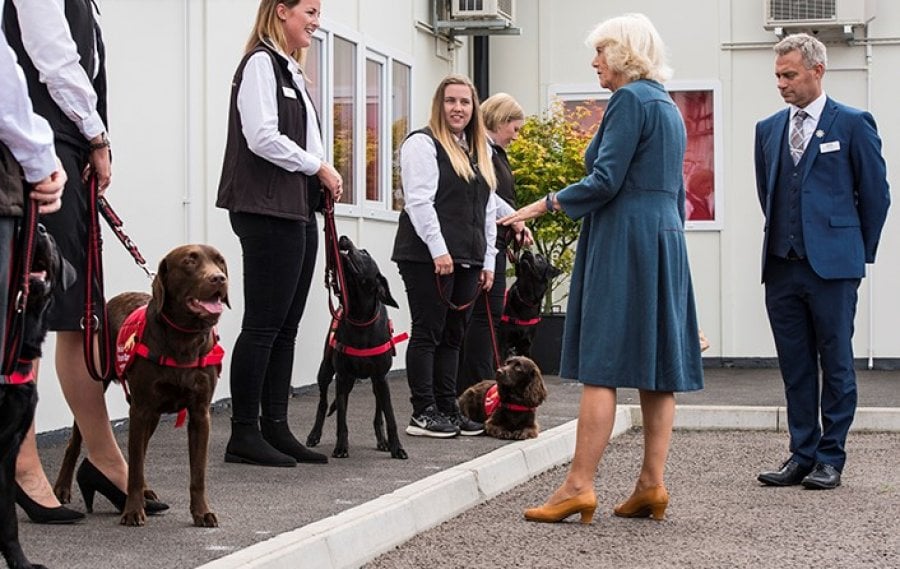HRH The Duchess of Cornwall meets the dogs who could detect COVID-19
9 September 2020 London School of Hygiene & Tropical Medicine London School of Hygiene & Tropical Medicine https://lshtm.ac.uk/themes/custom/lshtm/images/lshtm-logo-black.png
HRH The Duchess of Cornwall visits Medical Detection Dogs. Credit: MDD/BexArts
Patron of Medical Detection Dogs (MDD), HRH The Duchess of Cornwall, saw the dogs being put through their paces and learned more about the trial at MDD’s training centre near Milton Keynes. If successful, the specially-trained dogs could be used as a new rapid, non-invasive testing measure for COVID-19.
Before the dogs can put their noses to work, the research team need the public’s help donating odour samples. Anyone in England who has mild COVID-19 symptoms, and is due to have a swab test, or has had a swab test conducted in the past 24 hours, can provide samples of breath and body odour by wearing a mask for three hours, and nylon socks and a t-shirt for twelve hours.
Once the samples have been collected, they are taken to the London School of Hygiene & Tropical Medicine for analysis to identify compounds in odour that signify when someone is infected with COVID-19.
The samples are then sent to Medical Detection Dogs where six dogs will undergo training to identify the virus from the samples.
The Duchess was able to see the dogs sniffing out some of the first odour samples of COVID-19 collected by the team, but more samples are still needed. The researchers are aiming to collect 325 positive and 675 negative samples in order to confidently ascertain if these dogs can accurately detect the disease.
More information about volunteering for the study can be found here.
Professor James Logan, Head of the Department of Disease Control at the London School of Hygiene & Tropical Medicine, said: “I’m delighted HRH The Duchess of Cornwall has been able to get an insight into the vital work we’re doing with these dogs, while meeting some incredibly smart furry friends. This trial could allow us to rapidly screen high numbers of people, even those who are asymptomatic, if successful. It could revolutionise how we diagnose this virus, helping return our lives back to some sort of normality.”
If the trial is successful, the dogs could be used as a new rapid, non-invasive diagnostic tool for the virus. During the visit The Duchess also watched a demonstration of passive screening by the dogs, which – should the trial be successful – could be carried out at points of entry and public places.
HRH The Duchess of Cornwall, Camilla, said: “It will be a game changing moment for this country and the world, and luckily it’s Britain that is leading the way. But we do need help, we do need more positive samples. If we can appeal to all hospitals to please give...these samples because they are going to help to save thousands of lives, and I think that it is so important.”
Claire Guest, CEO and Co-Founder of Medical Detection Dogs, said: “We are very proud that HRH has been our Patron since 2014 and delighted to be able to show her our dogs working on COVID-19 samples. It is vital that we train our dogs to detect the odour of COVID-19 as soon as possible so we can help ensure people move about freely and safely. Public support is essential in making this possible. Anyone who assists us by providing samples will be playing a part in creating a fast, effective and non-invasive diagnosis for the virus and safer spaces for us all.”
Professor Steve Lindsay, from the Department of Biosciences at Durham University, said: “If we can show that our trained dogs can identify people carrying the virus, but who are not sick, it will be a game changer. We will then be able to scale-up the use of dogs at ports of entry to identify travellers entering the country with the virus. This could be very important to help prevent a second wave of the epidemic.”
If you enjoyed this article and would like to build a career in global health, we offer a range of MSc programmes covering health and data, infectious and tropical diseases, population health, and public health and policy.
Available on campus or online, including flexible study that works around your work and home life, be part of a global community at the UK's no.1 public health university.